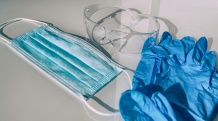Articles

Researchers urged for the focus on tackling single-use plastics to shift towards designing waste out of the supply chain
Hospitals in Cornwall committed to cutting plastic use – but ‘closing the loop’ essential, say researchers
Cornwall's hospitals are redoubling their efforts to use less single-use plastics despite the huge demand for PPE during the Covid-19 pandemic.
A team of researchers from the University of Exeter’s ExeMPLaR plastics research project collected data and interviewed staff at Royal Cornwall Hospitals NHS Trust about how single-use plastic consumption had been affected by the pandemic.
They found the Trust's efforts to reduce its plastic consumption were ongoing, despite the 'psychological effects' of Covid-19 and the perception that PPE made from plastics is safer than reusable alternatives.
The researchers highlighted the need, however, for a ‘circular economy’ for healthcare materials as the only long-term solution to single-use plastic consumption, as this would allow plastics to be reused and remade into other materials.
The Royal Cornwall Hospitals NHS Trust (RCHT) is regarded as an NHS sustainability front runner, with its monthly procurement of face masks per staff member averaging close to zero before the pandemic.
Among efforts to improve sustainability, it has invested in a Sterimelt machine, which enables the hospital to recycle and repurpose wasted masks and other plastic equipment.
The Trust, which declared a ‘Climate Emergency’ in March 2020, is also part of a national trial into using reusable face masks and clinical gowns, with 6,000 fabric reusable masks bought and distributed in November to non-clinical areas in the Royal Cornwall Hospital.
Efforts have also been made to replace single-use masks in Covid-low-risk units with reusable masks that can last for at least 40 washes.
While applauding these efforts, the researchers warned that simply reducing single-use plastic waste is not the long-term solution to ensure environmental sustainability.
They urged for the focus on tackling plastic use to shift towards the product design stage and developing a ‘closed loop’ system where waste is designed out of the supply chain.
The early stages of the pandemic in Cornwall saw almost 1.7 million masks procured by NHS England for the Trust's 5,200 full-time staff members based on estimated local demand.
The team said this highlights the need for investment in technologies and processes that can recycle and reuse a wider range of single-use plastics, and for innovation to find sustainable alternatives to replace single-use consumables.
The research team included experts from the University of Exeter’s European Centre for Environment and Human Health, Environment and Sustainability Institute as well as the College of Medicine and Health and the University of Exeter Business School.
Lead author Dr Sam Hu, a Research Fellow at the University of Exeter’s Environment and Sustainability Institute, said: “In the face of climate change and the pandemic, we argue that a closed loop system, also known as the circular economy, must be implemented by the NHS as the only long-term solution to the consumption of single-use plastics in healthcare materials.
“In the meantime, while COVID-19 has increased the procurement and the use of single-use plastic substantially, the focus of the RCHT on implementing measures to reduce single-use plastic in the long term remains strong – something we found encouraging.
Roz Davies, Care Group General Manager at the Royal Cornwall Hospitals NHS Trust, said: “We continue to process approximately 3,000 single use masks each day with the long-term aim of using reusable masks for clinical areas. It is hoped that pathways will be in place and the cost will have reduced ready for the introduction into sterile areas, such as theatres, when social distancing regulations are lifted.”
‘Single-use plastic and COVID-19 in the NHS: Barriers and opportunities’ is published in the Journal of Public Health Research.
Date: 29 September 2021
